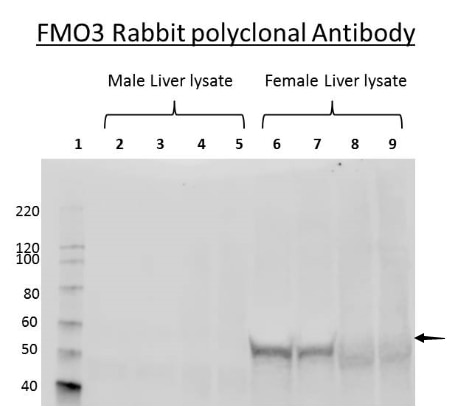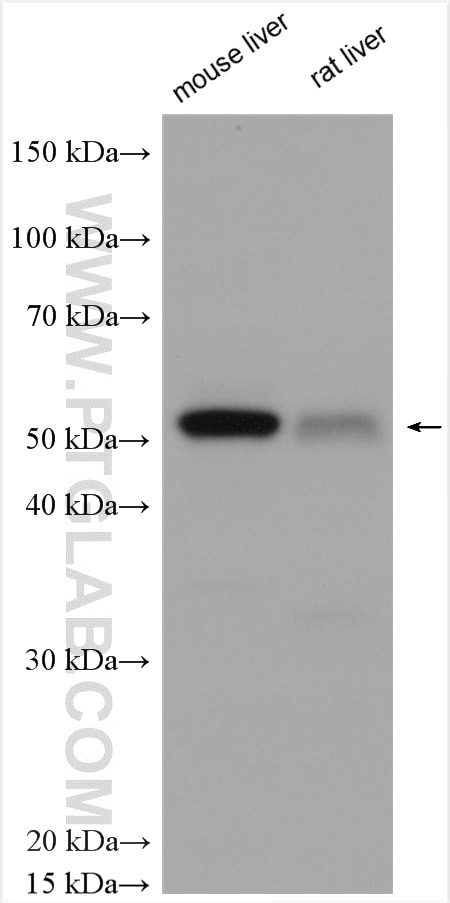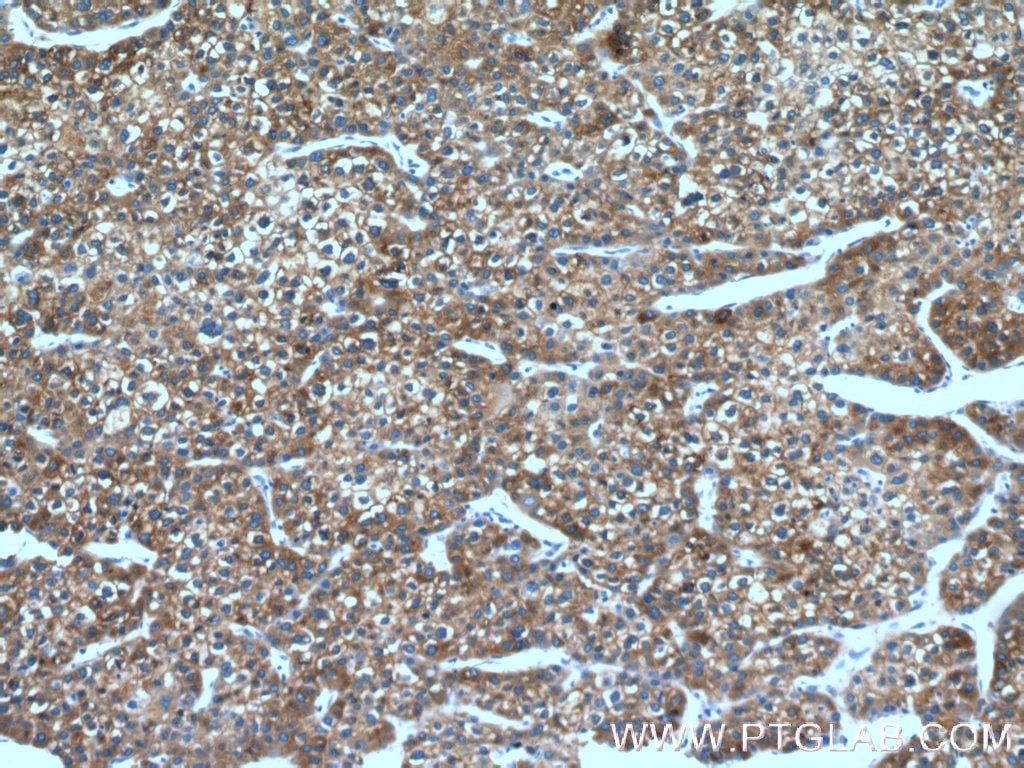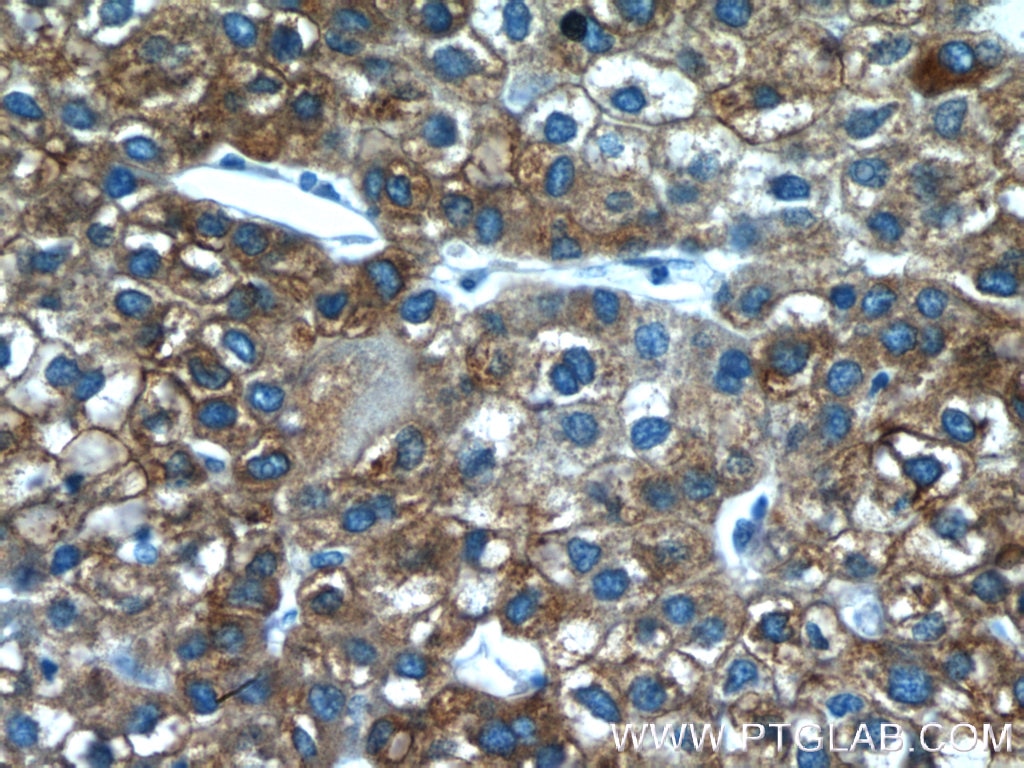- Featured Product
- KD/KO Validated
FMO3 Polyklonaler Antikörper
FMO3 Polyklonal Antikörper für WB, IHC, ELISA
Wirt / Isotyp
Kaninchen / IgG
Getestete Reaktivität
human, Maus, Ratte
Anwendung
WB, IHC, ELISA
Konjugation
Unkonjugiert
Kat-Nr. : 17469-1-AP
Synonyme
Geprüfte Anwendungen
| Erfolgreiche Detektion in WB | Mauslebergewebe, Rattenlebergewebe |
| Erfolgreiche Detektion in IHC | humanes Leberkarzinomgewebe Hinweis: Antigendemaskierung mit TE-Puffer pH 9,0 empfohlen. (*) Wahlweise kann die Antigendemaskierung auch mit Citratpuffer pH 6,0 erfolgen. |
Empfohlene Verdünnung
| Anwendung | Verdünnung |
|---|---|
| Western Blot (WB) | WB : 1:100-1:500 |
| Immunhistochemie (IHC) | IHC : 1:50-1:500 |
| It is recommended that this reagent should be titrated in each testing system to obtain optimal results. | |
| Sample-dependent, check data in validation data gallery | |
Veröffentlichte Anwendungen
| WB | See 7 publications below |
| IHC | See 2 publications below |
Produktinformation
17469-1-AP bindet in WB, IHC, ELISA FMO3 und zeigt Reaktivität mit human, Maus, Ratten
| Getestete Reaktivität | human, Maus, Ratte |
| In Publikationen genannte Reaktivität | Maus, Ratte |
| Wirt / Isotyp | Kaninchen / IgG |
| Klonalität | Polyklonal |
| Typ | Antikörper |
| Immunogen | FMO3 fusion protein Ag11405 |
| Vollständiger Name | flavin containing monooxygenase 3 |
| Berechnetes Molekulargewicht | 532 aa, 60 kDa |
| Beobachtetes Molekulargewicht | 60 kDa |
| GenBank-Zugangsnummer | BC032016 |
| Gene symbol | FMO3 |
| Gene ID (NCBI) | 2328 |
| Konjugation | Unkonjugiert |
| Form | Liquid |
| Reinigungsmethode | Antigen-Affinitätsreinigung |
| Lagerungspuffer | PBS with 0.02% sodium azide and 50% glycerol |
| Lagerungsbedingungen | Bei -20°C lagern. Nach dem Versand ein Jahr lang stabil Aliquotieren ist bei -20oC Lagerung nicht notwendig. 20ul Größen enthalten 0,1% BSA. |
Hintergrundinformationen
Microsomal flavin-containing monooxygenase (FMO) catalyzes the FAD-, NADPH-, and O2-dependent oxidation of a large number of xenobiotics containing soft nucleophiles,including alkaloids, pesticides, and pharmaceutical substances.Based on the cDNA sequence, the FMOs are classified into five subfamilies (FMO1 to FMO5) (PMID:11792679).In human beings, FMO3 is predominant in the adult liver, but not appear sex-dependent in the adult human liver. In the mouse liver, its expression has been shown to be sex-dependent and expressed only in females (PMID:11996886). Defects in FMO3 are the cause of trimethylaminuria (TMAU). This antibody is specific to FMO3.
Protokolle
| PRODUKTSPEZIFISCHE PROTOKOLLE | |
|---|---|
| WB protocol for FMO3 antibody 17469-1-AP | Protokoll herunterladen |
| IHC protocol for FMO3 antibody 17469-1-AP | Protokoll herunterladenl |
| STANDARD-PROTOKOLLE | |
|---|---|
| Klicken Sie hier, um unsere Standardprotokolle anzuzeigen |
Publikationen
| Species | Application | Title |
|---|---|---|
J Hazard Mater Dietary titanium dioxide particles (E171) promote diet-induced atherosclerosis through reprogramming gut microbiota-mediated choline metabolism in APOE-/- mice. | ||
EBioMedicine Akkermansia muciniphila prevents cold-related atrial fibrillation in rats by modulation of TMAO induced cardiac pyroptosis. | ||
Front Microbiol Berberine Improves Vascular Dysfunction by Inhibiting Trimethylamine-N-oxide via Regulating the Gut Microbiota in Angiotensin II-Induced Hypertensive Mice. | ||
Food Sci Biotechnol Effects of black raspberry extract on gut microbiota, microbial metabolites, and expressions of the genes involved in cholesterol and bile acid metabolisms in rats fed excessive choline with a high-fat diet | ||
Int J Biochem Cell Biol Deciphering the diurnal rhythm regulating mechanism of flavin-containing monooxygenase 3 in mouse liver | ||
Antimicrob Agents Chemother Metabolic mechanism and pharmacological study of albendazole in secondary hepatic alveolar echinococcosis (HAE) model rats |





